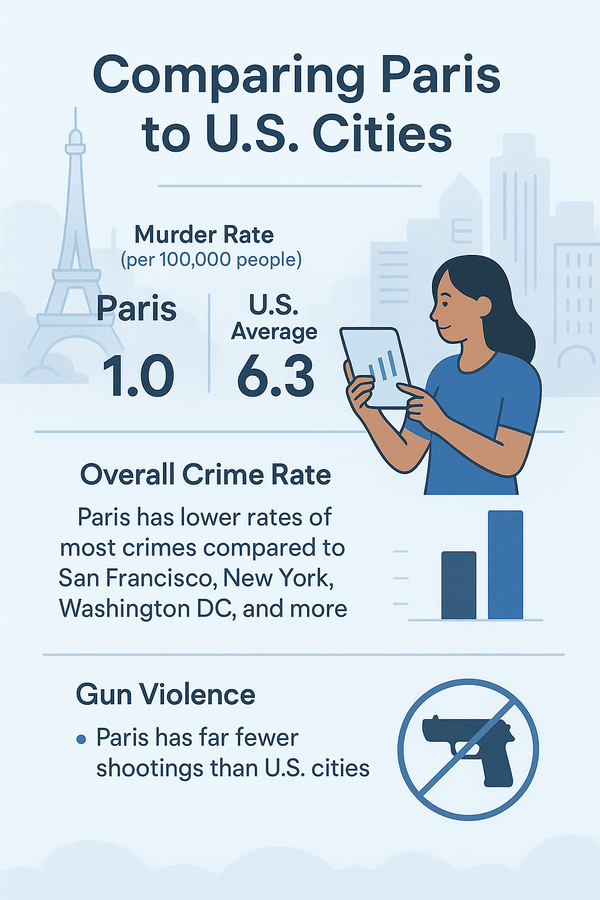Moving to Paris for Work? Here's What You Need to Know About Your U.S. Pensions

For high-earning American professionals in tech or management — especially those earning $150K–$300K — the idea of relocating to Paris is exciting. You’re imagining beautiful architecture, top-tier cuisine, and the kind of work-life balance the U.S. rarely offers.
But just as you're exploring how to move, one crucial question arises: What happens to my U.S. retirement savings if I leave? Whether it’s a 401(k), Roth IRA, or Social Security, your pension strategy deserves a clear, confident answer.
The problem is uncertainty about international finances, which causes hesitation. You want your long-term wealth to stay secure — and grow — so you can thrive now and retire comfortably later.
This guide walks you through everything you need to know.
1. You Keep Your U.S. Retirement Accounts
Your 401(k), Traditional IRA, and Roth IRA accounts remain yours when you move to France.
- You can’t usually contribute to an IRA unless you have U.S.-earned income.
- You can continue growing those accounts with investment gains.
- You’ll manage them online via U.S.-based brokerages like Fidelity, Vanguard, or Schwab (Schwab is particularly expat-friendly).
Tip: Don’t move your accounts to a non-U.S. institution — it can create IRS issues.
2. You Still Qualify for U.S. Social Security
If you've worked in the U.S. for at least 10 years (earning 40 credits), you’re eligible for Social Security — even if you move abroad.
If you haven’t hit 10 years yet? Thanks to the U.S.-France totalization agreement, your work years in France may help you qualify.
Yes, you can live in Paris and receive your U.S. benefits by direct deposit.
Need help? Email us at franceexpatservices@gmail.com
3. You Won’t Be Taxed Twice
One of the top fears: "Will I pay income tax in both countries?"
✅ Good news: No, not if you plan wisely.
- The U.S. taxes its citizens on global income, but tools like the Foreign Earned Income Exclusion (FEIE) and foreign tax credits can offset this.
- France and the U.S. have a tax treaty that avoids double taxation.
Best practice: Work with a tax advisor familiar with U.S.–France expat tax law (we can recommend a few).
4. Don’t Cash Out Early — It Hurts
Tempted to simplify things by cashing out your 401(k)? Don’t. You’ll face:
- Federal taxes
- Early withdrawal penalties
- Lost future investment growth
Instead:
- Leave your 401(k) as-is (if allowed)
- Or roll it into an IRA with an expat-friendly U.S. firm
5. French Pensions Add a Bonus Layer of Security
Once you start working in France, you’ll pay into the French pension system. This isn’t optional — but it’s not a drawback, either.
- Contributions build defined benefits, not market-tied like U.S. 401(k)s
- Even 5–10 years of work in France can earn you a retirement income
- Payments are indexed and guaranteed by the state
You can receive both U.S. and French pension benefits — wherever you retire.
6. Retiring in France on U.S. Savings: Yes, You Can
Hundreds of thousands of Americans already do this. Why?
- Lower healthcare costs
- High quality of life
- Rich culture and travel options
You can live in France while drawing income from:
- 401(k)s or IRAs
- Social Security
- French public pensions
You’ll need to apply for a long-stay visa or residency permit, but that process is straightforward — especially if you have stable retirement income.
7. You’ll Want a Cross-Border Strategy
If you’re in your 30s or 40s, this move could be temporary — or permanent. Either way, build a flexible plan:
- Keep your U.S. assets growing
- Build French pension eligibility
- Consider international index funds or EU-based savings for local diversification
Talk to a financial planner who understands both systems. We can connect you.
Final Thoughts
Moving to Paris won’t derail your retirement. In fact, with smart decisions, it can enhance it.
You’ll likely end up with a three-layer retirement income:
- U.S. savings (401k, IRA, Roth)
- U.S. Social Security
- French public pension (if you work in France)
Each system has its strengths — and together they offer robust long-term security.
Ready to Make the Leap?
If you want tailored help planning your move, understanding taxes, or speaking with relocation advisors, reach out to us at franceexpatservices@gmail.com.
Your next chapter in Paris can be the smartest move of your career and your retirement strategy.




